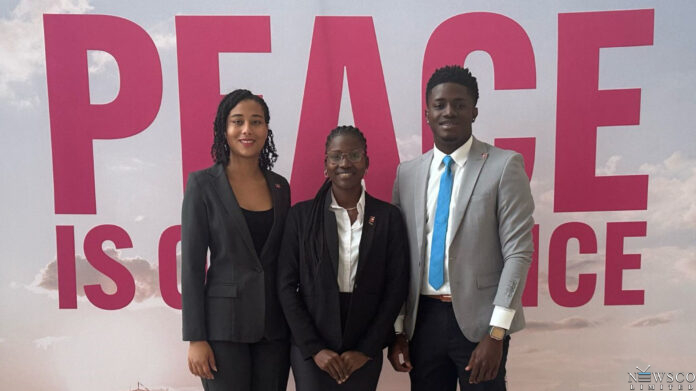Three National Youth Ambassadors who recently attended the United Nations Economic and Social Council (ECOSOC) Youth Forum in New York, described the event as engaging and thought-provoking. The youth ambassadors Janet Simon, Pia Nichols and Shaquan O’Neil were among scores of young people who gathered at the United Nations Headquarters from April 16 to 18.
Director of Youth Affairs Dr Jrucilla Samuel accompanied the ambassadors to the forum whose theme highlighted the need for action.
It aligned with that of the 2024 High-level Political Forum on, “Reinforcing the 2030 Agenda and eradicating poverty in times of multiple crises: the effective delivery of sustainable, resilient and innovative solutions.”
On this global platform, young people identified some of their greatest challenges and appealed for assistance to improve the plight of vulnerable youth, including those without internet access.
Youth ambassador Janet Simon said that “while ECOSOC was an opportunity for me to meet and network with numerous young leaders, it was difficult to escape the issue of joblessness. Approximately 70 million young people worldwide are unemployed, and if that is not cause for concern, I don’t know what is. We are going to have to create more opportunities for them to get meaningful jobs or else we all will feel the catastrophic effects”.
The 25-year-old, who is also an educator, stated that the forum forced her to reflect on the real state of affairs, which is often glamorized in the media. “When you meet young people from other parts of the world and realize that your normal is far different from theirs. It causes you to be more active in the fight against injustice.”
As she thinks more deeply about her contributions to the 2030 agenda and beyond, Simon underscored the need to teach transferable skills. “It formed part of the ECOSOC discussions and these skills help to make young people more marketable. Skills like critical thinking and problem-solving are essential to deal with everyday challenges,” she added.
The need to increase connectivity was also high on the ECOSOC agenda. That aspect captivated 20-year-old Shaquan O’Neil who asserted: “I am on a mission to provide opportunities for youths to have access in the digital space. If we are really going to have a greater impact in schools, the workplace, and even at home, reliable access to the internet should be a must-have.”
O’Neil pointed out that digital skills are not only transferrable, but also considered life skills, because they enhance employability and professional growth. “In this digital world, they make it easier for youths to land jobs and solve problems. The ECOSOC Forum opened my eyes to lots of employment opportunities and many of them are online.”
Fellow ambassador Pia Nichols agreed with O’Neil. “With youth unemployment 3.5 times higher than adults,” she said, “the digital space is a good avenue to fight this crisis. However, we must ensure that as we try to bridge the divide, we teach the youths how to use the internet responsibly.”
Acknowledging that the number of persons without internet access has decreased, Nichols said “much more progress is still needed. With only 2.6 billion people connected worldwide, that means poverty is still rampant worldwide. We cannot make real strides if a vast population of people are unconnected. Digital inclusion matters.”
Meanwhile, the Director of Youth Affairs said that “it was a remarkable first-time experience for our young people who were able to gain fresh perspectives and listen to other youth impacted by issues they never experienced or may face in their lifetime.
“There is this yearning desire for knowledge and collaborations and we are committed to giving them these opportunities that will keep them engaged in meaningful activities”.
The United Nations Economic and Social Council’s Youth Forum 2024 addressed five SDGs: no poverty (SDG 1), zero hunger (SDG 2), climate action (SDG 13), peace, justice and strong institutions (SDG 16) and partnerships for the goals (SDG 17).

